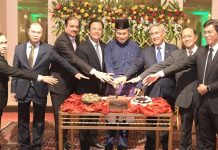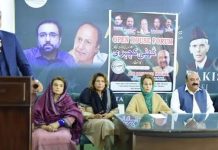ISLAMABAD, FEB 10 (DNA) : Talks between Pakistani officials and an International Monetary Fund (IMF) delegation are under way with the meeting expected to focus on imposition of new taxes worth Rs 200 billion, among other issues.
An IMF mission is currently on a visit to Pakistan to review the economy’s performance in line with the conditions related to the Fund’s loan programme. The successful review would pave the way for the release of the third tranche under the $6 billion extended fund facility.
Today’s meeting is likely to focus on imposition of new taxes worth Rs200 billion. The government is likely to take a decision regarding the hike in power and gas tariffs to eliminate subsidies for crucial ease of monetary pressure on the budget, the publication stated.
The policy level talks would also determine the revised tax revenue target of the Federal Board of Revenue. The meeting will also take up measures letting regulatory bodies, Nepra and Ogra work independently.
The visiting delegation will also be provided details of loss-making institutions and roadmap for their privatisation. New slabs for the power sector are likely to be introduced as well.
Amid growing concerns over the record inflation and its impact on the masses, the PTI government has told the Fund that the steps taken in this regard would stabilise the food prices in the coming months.
In an earlier meeting, Minister for National Food Security and Research Khusro Bakhtiar told the IMF mission the government was taking all the necessary measures for the management of food inflation.
“A bumper wheat crop is expected this year and there will be no issue of wheat supply in the coming months,” the minister informed them.
‘Relief to masses top priority’
Prime Minister Imran Khan on Saturday said his government will go to any extent to provide relief to masses and check price hike of essential commodities.
He expressed these views while chairing a meeting of his economic team with reference to key commodities’ prices, including flour, sugar, cooking oil and rice.
The meeting took stock of the steps for bringing prices of these items down under the premier’s directions.
Actual inflation
Meanwhile, Pakistan Bureau of Statistics (PBS), citing estimates of various researchers, said January inflation was around 13 per cent, whereas the actual inflation compiled by it was 14.6 per cent, “more than what was estimated”.
“The inflation is higher because the prices were collected during the peak of the price surge in mid of the month,” it said in a statement. “It (PBS) followed standard operating procedures regarding the time schedule for data collection.”
PBS denied an impression that inflation figure was understated, saying the institution is unbiased towards compilation and publication of price statistics.
The bureau said it collects real-time prices data based on android technology equipped with a global positioning system and monitored at different levels.
The prices data collection, validation and publication are well synchronised with the best global standard classification of individual consumption by purpose.
It compiles data without any political intervention or motivation and transparency is ensured regarding city-wise price data. “Therefore, fudging of the data is not possible,” it added.
















